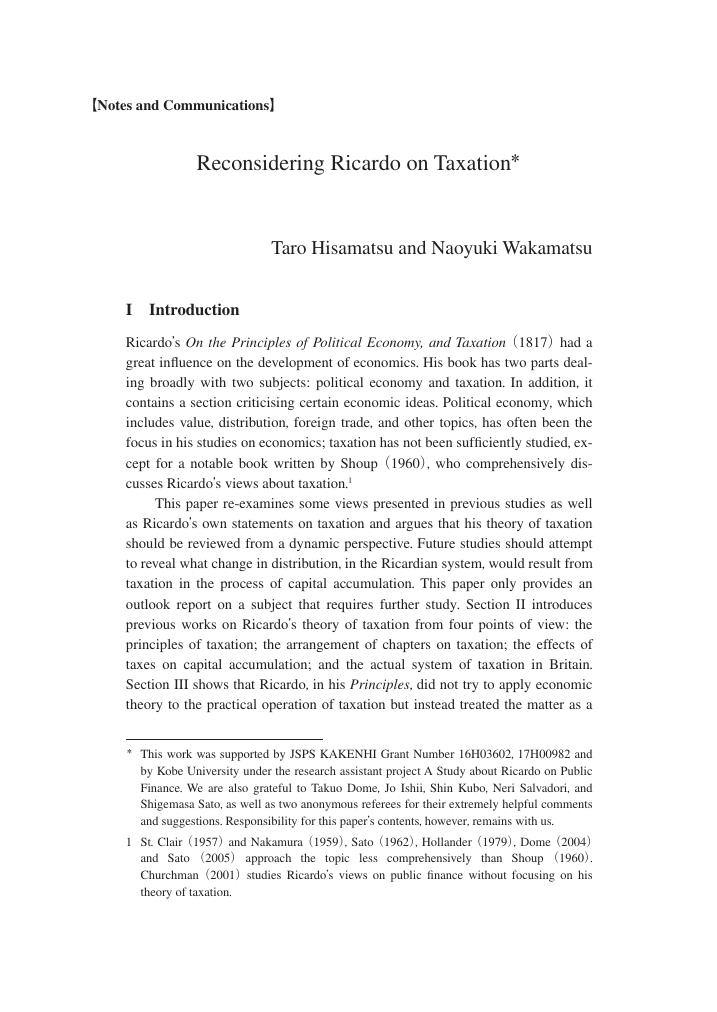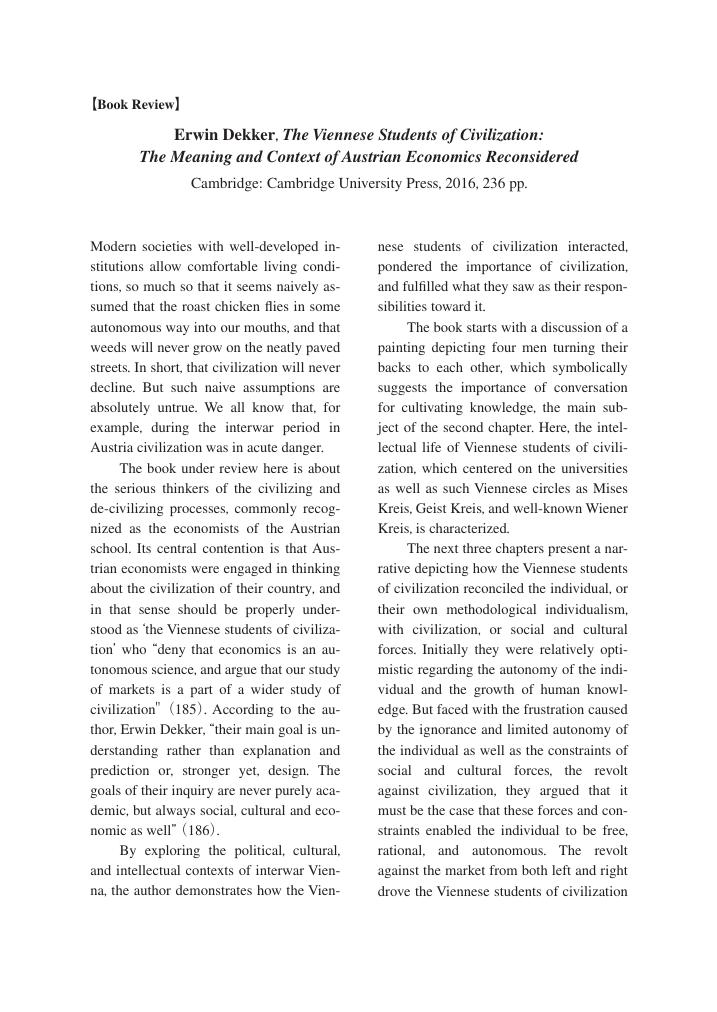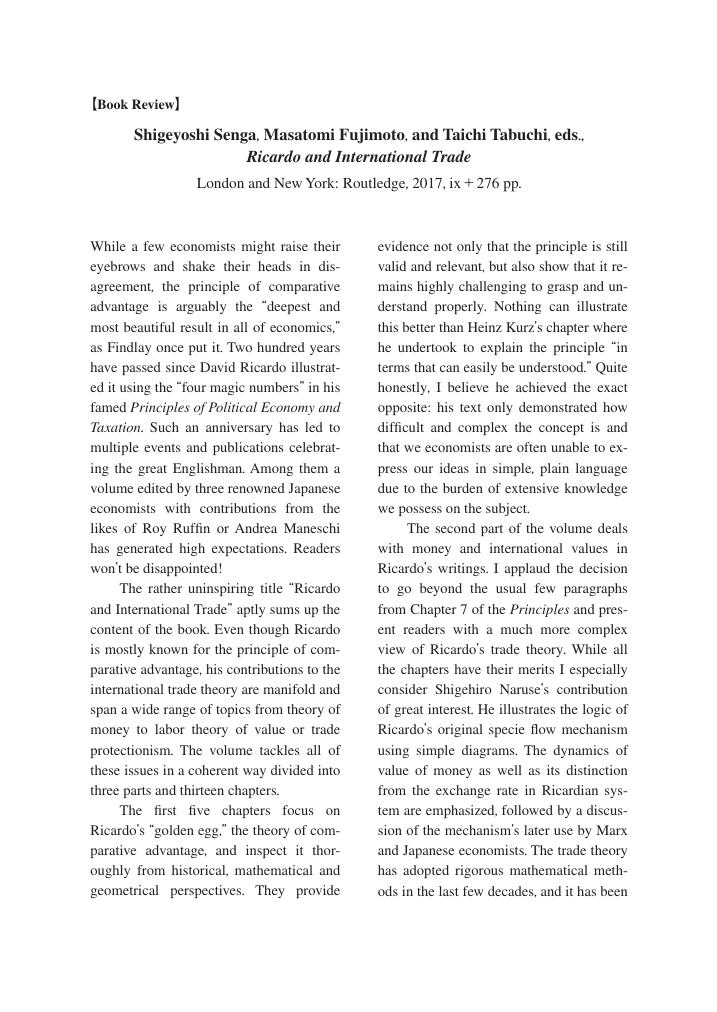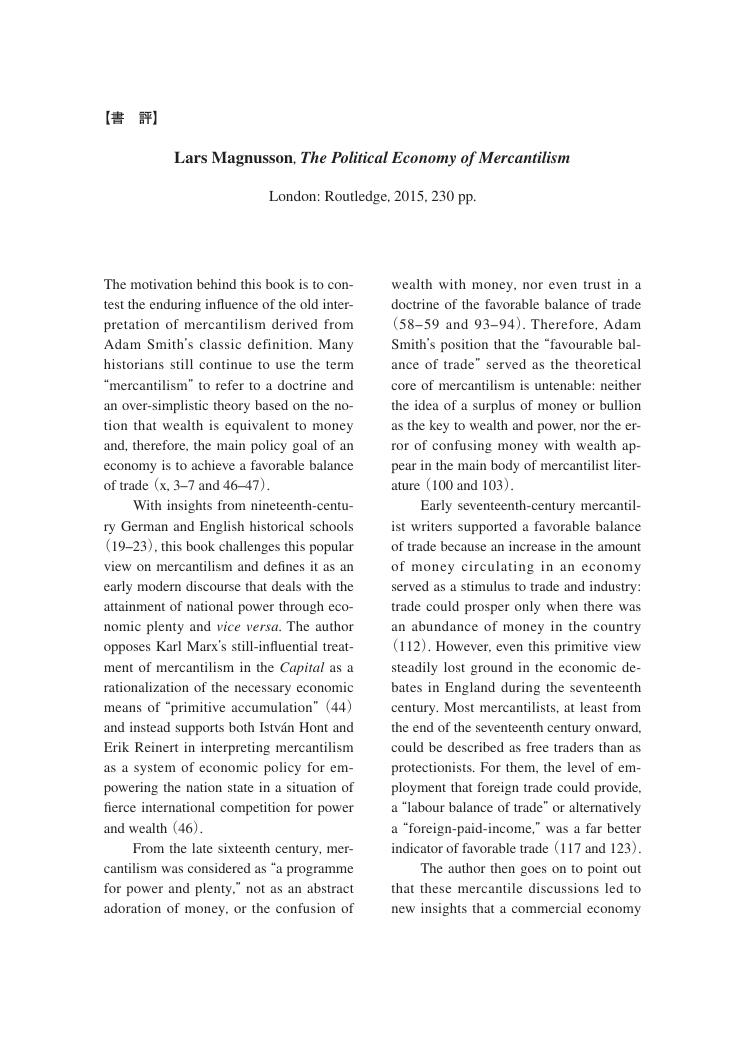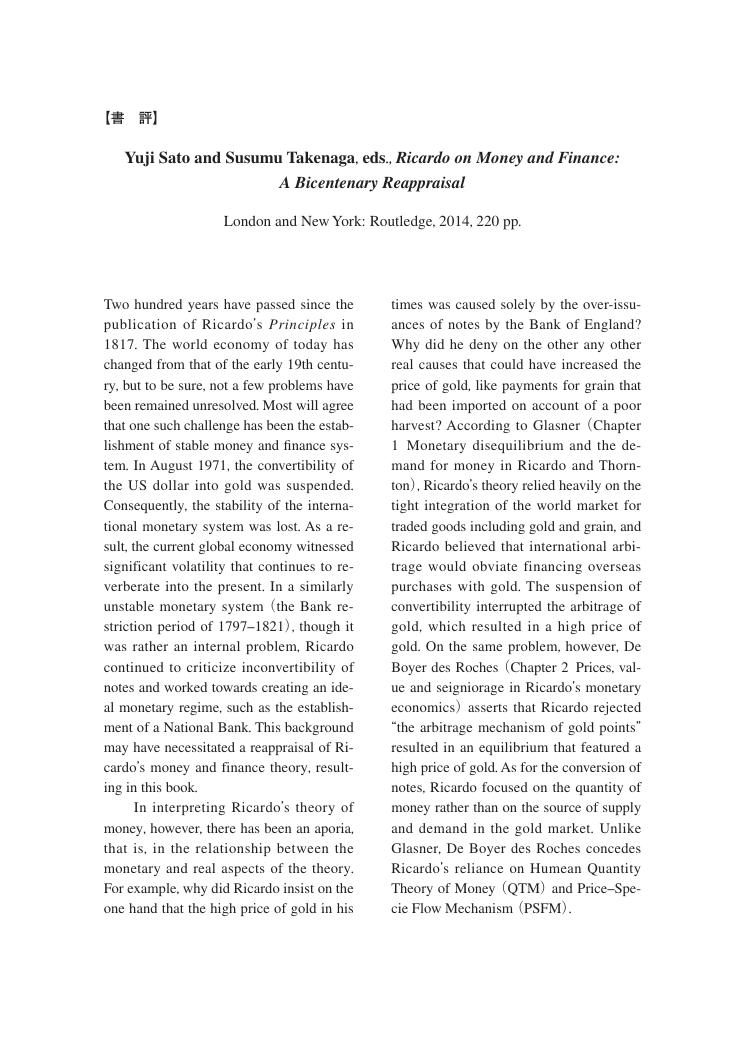1 0 0 0 OA 菱山泉訳 スラッファ『経済学における古典と近代』
- 著者
- 菱山 泉 宮本 順介 Robert Chapeskie
- 出版者
- The Japanease Society for the History of Economic Thought
- 雑誌
- 経済学史研究 (ISSN:18803164)
- 巻号頁・発行日
- vol.60, no.2, pp.42-96, 2019 (Released:2019-09-04)
Introduction by Junsuke Miyamoto In 1956 Izumi Hishiyama and Yoshihiro Taguchi translated two essays by Piero Sraffa, ʻSulle relazioni fra costo e quantità prodottaʼ (1925) and ʻThe Laws of Returns under Competitive Conditionsʼ (1926), and published them, with the addition of commentary by Hishiyama, as Keizaigaku ni okeru Koten to Kindai-Shinkotengakuha no Kentō to Dokusenriron no Tenkai (The Classical and the Modern in Economics: The Examination of the Neoclassical School and the Development of Monopoly Theory, Tokyo: Yuhikaku) in the same year. It is the commentary by Hishiyama included in this book, ʻSraffaʼs Position in the History of Economic Thought and the Significance of his Study of Ricardo,ʼ that has been translated into English here. Izumi Hishiyama (1923-2007) began his work as a scholar with the study of François Quesnayʼs tableau économique, and the results of these efforts were brought together in ʻThe Tableau Économique of Quesnay: Its Analysis, Recon-struction and Applicationʼ (Kyoto University Economic Review, April 1960). This work received international acclaim as the first thoroughgoing attempt at a dynamic treatment of the tableau économique model. Later, Hishiyama en-countered Sraffaʼs essay ʻSulle relazioni fra costo e quantità prodotta,ʼ which made a profound impression on him, and through the intermediary of Sraffa developed an interest in classical school economics centred on David Ricardo, on the one hand, and the economics of Alfred Marshall and the Cambridge school, on the other. On the basis of an approach that involved reviving the ideas of the classical school in modern economics, Hishiyama presented a large amount of excellent research ranging from the economics of the classical school to the economics of his day. He is renowned in particular as a pioneer of Sraffian economics in Japan, and in 1962 published, together with Hiroshi Yamashita as his co-translator, a groundbreaking Japanese translation of Production of Commodities by Means of Commodities: Prelude to a Critique of Economic Theory (1960), one of Sraffaʼs most important works. In 1993 he published Sraffa Keizaigaku no Gendaiteki Hyōka (A Modern Evaluation of Sraffian Economics, Kyoto: Kyoto University Press), a text that can be described as one of his most significant works, in which he considered Sraffaʼs economics from a multi-layered perspective and attempted to establish his contribution to modern economics.
1 0 0 0 OA Reconsidering Ricardo on Taxation
- 著者
- 久松 太郎 若松 直幸
- 出版者
- The Japanease Society for the History of Economic Thought
- 雑誌
- 経済学史研究 (ISSN:18803164)
- 巻号頁・発行日
- vol.60, no.2, pp.97-101, 2019 (Released:2019-09-04)
- 著者
- 中井 大介
- 出版者
- The Japanease Society for the History of Economic Thought
- 雑誌
- 経済学史研究 (ISSN:18803164)
- 巻号頁・発行日
- vol.60, no.2, pp.113-114, 2019 (Released:2019-10-14)
- 著者
- 尾近 裕幸
- 出版者
- The Japanease Society for the History of Economic Thought
- 雑誌
- 経済学史研究 (ISSN:18803164)
- 巻号頁・発行日
- vol.60, no.1, pp.191-192, 2018 (Released:2019-11-05)
- 著者
- Martin Grančay
- 出版者
- The Japanease Society for the History of Economic Thought
- 雑誌
- 経済学史研究 (ISSN:18803164)
- 巻号頁・発行日
- vol.60, no.1, pp.195-196, 2018 (Released:2019-11-05)
1 0 0 0 OA J. R. McCulloch on the Effect of Machinery
- 著者
- 石井 穣
- 出版者
- The Japanease Society for the History of Economic Thought
- 雑誌
- 経済学史研究 (ISSN:18803164)
- 巻号頁・発行日
- vol.60, no.1, pp.1-19, 2018 (Released:2019-09-03)
Abstract: The differences between the theories of displacement and of compensation of machinery are related not only to issues regarding employment and income distribution but also to the dif-ferent perspectives on the market economy. Neoclassical as well as contemporary economists criticise Ricardoʼs machinery theory in the third edition of his Principles (1817), which casts serious doubt on the efficiency of a market economy. The compensation theory advocated by economists, such as McCulloch, was in accordance with the neoclassical criticism of Ricardo, wherein they perceive a market economy to be an efficient one. The development of the com-pensation theory has rarely been studied so far, although its development can be observed in the same way as that of the displacement theory. This study examines the formation of McCullochʼs compensation theory in his debate with Ricardo and its relevance to the neoclassical criticism of Ricardoʼs machinery theory. McCulloch insisted on the general benefits of machinery from the beginning as stated in ʻTaxation and the Corn-Lawsʼ (1820). The basic framework of McCullochʼs compensation theory emerged in ʻEffects of Machinery and Accumulationʼ (1821), in which he argued that workers displaced by the introduction of machinery could be employed again owing to the expansion of production, which would be stimulated by the growing demand for commodities caused by the fall in prices. In the correspondence with Ricardo, after the publication of the third edition of Ricardoʼs Principles, McCulloch withdrew his criticism that Ricardo had accepted the possibility of a general glut and focused his criticism on the decrease in gross produce. McCulloch assumes that in arguing this, the maximum amount of a product could necessarily be achieved in the competitive market under a given condition. JEL classification numbers: B 12, B 31, O 33.
- 著者
- 田淵 太一
- 出版者
- The Japanease Society for the History of Economic Thought
- 雑誌
- 経済学史研究 (ISSN:18803164)
- 巻号頁・発行日
- vol.60, no.1, pp.79-99, 2018 (Released:2019-09-03)
- 被引用文献数
- 2
Abstract: This paper presents a new interpretation of Ricardo’s international trade theory. It shows that Ricardo’s value theory in his Principles can be understood exclusively as the cost-of-production theory of value, which integrates the domestic value theory and international value theory, requisitely taking into consideration changes in the value of money when it is applied to the analysis of international exchange. In Section II, we critically re-examine the standard interpretation of Ricardo’s trade theory in the so-called ‘Ricardian Model’ in textbooks today. Based on the concepts of ‘comparative advantage’ and ‘gains from trade’ within the two-country two-commodity framework, we show that it is a distorted interpretation, which originated from J. S. Mill’s arguments and established through the debate between Viner and Haberler, in the opposite direction of Ricardo’s original value theory. In Section III, we present that Ricardo consistently adopted the cost-of-production theory of value, which is valid not only for domestic, but also international, exchange based on the concept of natural price, with the so-called ‘labour theory of value’ being merely a subset rule in the analysis of domestic exchange. We then show that Ricardo’s original value theory inevitably takes into consideration the differences and adjustments in the value of money in international exchange, in the analysis of international exchange. Finally, we will briefly review that Ricardo was heading in the right direction towards today’s theory of international trade including intermediate goods. JEL classification numbers: B 12, B 17.
1 0 0 0 OA 杉原四郎 J.S.ミルと現代
- 著者
- 杉原 四郎 松井 名津 橋本 昭一 Robert Chapeskie
- 出版者
- The Japanease Society for the History of Economic Thought
- 雑誌
- 経済学史研究 (ISSN:18803164)
- 巻号頁・発行日
- vol.60, no.1, pp.100-136, 2018 (Released:2019-09-03)
Introduction by Shoichi Hashimoto Shiro Sugiharaʼs “Nature, Human Beings, and Labour,” translated here into Eng-lish, was originally published in Japanese in J. S. Miru to Gendai (J. S. Mill and the Present Day), 1980, Tokyo: Iwanami Shoten, and reprinted in Volume 2, 2003, of The Works of Shiro Sugihara, 4 Volumes, 2003-, Tokyo: Fujiwara Sho-ten. Shiro Sugihara (1920-2009) began his study of the history of economic thought with a comparison of Karl Marx and J. S. Mill. While he does not ex-plicitly mention it in any of his writings, in this he may have been influenced by his mentor, Kei Shibata (1902-1986). Shibata had been attempting to further develop Marxʼs theory of reproduction using the methods of general equilibrium theory. While carefully tracing the process of development of Marxʼs economic thought, by explicating Marxʼs crit-icism of Mill Sugihara played a major role in the post-war Japanese movement to re-evaluate Mill, who had historically received only low appraisal. Sugihara presented Millʼs stance of engaging with contemporary economic issues in a positive light, an approach that is given full expression in the essay translated here. While Japanese readers would not require any explanation regarding Sawako Ariyoshi (1931-1984), the novelist who appears at the start of the es-say, she was a writer who raised new social issues such as synthetic pollution, food damage, issues related to the elderly, and so on, that have since become common knowledge, posing them to society in a series of works written in rapid succession that all went on to become bestsellers. As a result of the nature of her writing she was ignored by various literary awards.
1 0 0 0 OA 猪木武徳『自由の思想史』『自由の条件』
- 著者
- 橋本 努
- 出版者
- The Japanease Society for the History of Economic Thought
- 雑誌
- 経済学史研究 (ISSN:18803164)
- 巻号頁・発行日
- vol.60, no.1, pp.164-170, 2018 (Released:2019-09-03)
- 著者
- 内山 隆
- 出版者
- The Japanease Society for the History of Economic Thought
- 雑誌
- 経済学史研究 (ISSN:18803164)
- 巻号頁・発行日
- vol.60, no.1, pp.171-178, 2018 (Released:2019-09-03)
1 0 0 0 OA Following in Shionoya's Footsteps:
- 著者
- Maria Cristina Marcuzzo
- 出版者
- The Japanease Society for the History of Economic Thought
- 雑誌
- 経済学史研究 (ISSN:18803164)
- 巻号頁・発行日
- vol.59, no.2, pp.168-180, 2018 (Released:2019-09-02)
- 被引用文献数
- 1
I Preface The late 1980s and early 1990s saw an upsurge of interest in Keynesʼs philo-sophical thinking, possibly favoured by the availability of the full set of the Col-lected Works, the reunion of all his papers at Kingʼs (the catalogue was com-pleted in 1993) and soon after the microfilming of all his entire papers (Cox 1995). Over the last 30 years or so a large literature has developed on the subject, which has branched out in various directions. Two main concerns can be found in this literature: (a) the question of the continuity of Keynesʼs views and ap-proach, since the early philosophical essays, through the Treatise on Probability to the General Theory; (b) how Keynesʼs economics is intertwined with his ethics and epistemology. In this paper I am focusing on a narrower topic (perfectionism and conse-quentialism in Keynesʼs ethics and political philosophy) following in the foot-steps of Yuichi Shionoya, whose contribution on the subject I revisited on the occasion of a commemoration held at the ESHET Conference in Paris, in May 2016. While much has been said in the literature on the non-consequentialist po-sition held by Keynes in ethics, less has been said on his being consequentialist in politics. Following in Shionoyaʼs footsteps, I would like to pursue the matter further, in particular on the implication for Keynesʼs economics.
- 著者
- 千賀 重義
- 出版者
- The Japanease Society for the History of Economic Thought
- 雑誌
- 経済学史研究 (ISSN:18803164)
- 巻号頁・発行日
- vol.59, no.2, pp.1-18, 2018 (Released:2019-09-02)
Abstract: The focus of this paper is the wars in Europe from the middle of the seventeenth century to the early nineteenth century and their relationship with contemporary economics1 (limited to England and Scotland). As for the relationship between war and economy, there has been the accepted view that war may arise due to particular economic interests. While it is true that early mercantilists saw foreign trade and war as inseparable, major economists in this period did not find a cause for war in economy. Economists wrestled with the practicalities of fi-nancing war, such as the tax reform, but as public loans were enlarged for the expenditure of war, warned against mercantilist wars and the bankruptcy of the state. Smith and Tucker had different opinions about the independence of the American colonies, and Malthus and Ricar-do disputed the causes of the recession that followed the Napoleonic Wars. The economists of this era, although considering war as a political matter, continued to look for ways to evade war. The issue of war as a struggle for supremacy between states was expected to be replaced by efforts to strengthen commercial and industrial competitiveness in the free trade market. JEL classification numbers: B 11, B 12, N 45.
- 著者
- 橋本 努
- 出版者
- The Japanease Society for the History of Economic Thought
- 雑誌
- 経済学史研究 (ISSN:18803164)
- 巻号頁・発行日
- vol.59, no.2, pp.19-34, 2018 (Released:2019-09-02)
Abstract: This paper raises a fundamental question and offers an original framework on war and peace arguments based on primarily examining contributions in the field of war and economic thought after World War II. Among the prominent figures in this field, I select three thinkers in the field of economic thought, E. Schumacher, J. Galbraith, and K. Boulding, who present-ed their own systematic visions of a peaceful society. The fundamental question on war and peace raised here is, how we receive the principles of bios and eros, and of prosperity, from an ideally peaceful situation, wherein the nature of peace is defined as “the negation of bios” (i.e., the principle of death). In order to examine this question, I propose an original frame-work and define the concepts of war and peace using categories of conflict and violence. In light of this fundamental question, in this paper, I reveal the contributions of the three thinkers to our understanding of creating a peaceful world. First, I present the background and explain the reasons for selecting these three figures. Second, I present the fundamental question and my theoretical framework to explore the responses of the three thinkers to the question. Finally, I clarify their responses and present an overview of their contributions to-wards a peaceful society. JEL classification numbers: B 20, B 52, P 40.
- 著者
- 羽鳥 卓也 千賀 重義 Robert Chapeskie
- 出版者
- The Japanease Society for the History of Economic Thought
- 雑誌
- 経済学史研究 (ISSN:18803164)
- 巻号頁・発行日
- vol.59, no.2, pp.118-161, 2018 (Released:2019-09-02)
- 被引用文献数
- 1
Introduction by Ken Mizuta and Shigeyoshi Senga The text of which this is a translation is Chapter 4 of Takuya Hatori (1922-2012)ʼs Kotenha Keizaigaku no Kihon Mondai (The Fundamental Question of Classical Economics), Tokyo: Miraisha, 1972. It had originally been published as an article with the same Japanese title, but Hatori gave it the slightly different English title ʻRicardoʼs theory of value and distribution in his Essay on Profitsʼ in Fukushima Universityʼs Sho―gaku Ronsyu― (The Journal of Commerce, Eco-nomics and Economic History), 34 (3), 91-151, 1965, and then added some re-visions, in particular a ʻtotal rewriteʼ of Section 5, when it was included in the book cited above. Before the publication of the article just noted, Hatori had presented a report entitled ʻEarly Ricardoʼs theories on distributionʼ at the 29th Annual Conference of the Japanese Society for the History of Economic Thought held in September 1965 at the Otaru University of Commerce, and ac-cording to the postscript of the original article ʻin substance this included the content of this text up to Section 4.ʼ Hatori states that he wrote the article after having given his presentation and considered the criticisms it elicited. Hatori began his academic work in the field of Japanese economic history but later shifted his region of research to the broad range of economic thought, from figures such as John Locke and Jean-Jacques Rousseau in the era of the civil revolution to classical economists in the eighteenth and early nineteenth centuries. Above all, he devoted his energies to study of British classical econo-mists like Adam Smith, Thomas Robert Malthus, and David Ricardo. Hatori particularly concentrated his efforts on the examination of Ricardoʼs economics.
1 0 0 0 OA 「国富論」における歴史批判(1973)
- 著者
- 服部 正治 Robert Chapeskie 小林 昇
- 出版者
- The Japanease Society for the History of Economic Thought
- 雑誌
- 経済学史研究 (ISSN:18803164)
- 巻号頁・発行日
- vol.59, no.1, pp.63-90, 2017 (Released:2019-09-01)
Introduction by Masaharu Hattori The late Noboru Kobayashiʼs “Historical Critique in Wealth of Nations: A Per-spective on Books III and IV,” translated here into English, was originally pub-lished in Japanese in Fukushima Universityʼs Shōgaku Ronsyū (The Journal of Commerce, Economics and Economic History), Vol. 41, No. 5, 1973, and re-printed in Volume 2, which is indicated as 《II》 in this translation, 1976, of The Works of Kobayashi Noboru on the History of Economic Thought, 11 Volumes, 1976-1989, Tokyo: Miraisha. The “Historical Critique” of the title of this article has a double meaning when it comes to its content. In one sense, it refers to Smithʼs criticism of history that goes against the natural progress of opulence and has been seen in Europe “after the fall of the Roman Empire” that is de-scribed in Book III of Wealth of Nations. In another sense, it refers to Kobaya-shiʼs criticism of the defect inherent in Smithʼs historical understanding. When it comes to the latter, Smith did not sufficiently recognize the historical fact that the mercantilist protectionism of the Government of the civil revolutions (par-ticularly the Glorious Revolution) in Britain protected and fostered the devel-opment of domestic industrial capital, bringing about the bi-polar separation of independent producers that advanced the development of the primitive accumu-lation of capital and eventually led to the establishment of the capitalist system. Kobayashiʼs historical critique can thus be summarized as pointing out Smithʼs flawed understanding of the historical significance of mercantilism.
- 著者
- 木村 雄一
- 出版者
- The Japanease Society for the History of Economic Thought
- 雑誌
- 経済学史研究 (ISSN:18803164)
- 巻号頁・発行日
- vol.59, no.1, pp.101-102, 2017 (Released:2019-10-12)
- 著者
- 御崎 加代子
- 出版者
- The Japanease Society for the History of Economic Thought
- 雑誌
- 経済学史研究 (ISSN:18803164)
- 巻号頁・発行日
- vol.59, no.1, pp.107-108, 2017 (Released:2019-10-12)
- 著者
- 牧野 邦昭
- 出版者
- The Japanease Society for the History of Economic Thought
- 雑誌
- 経済学史研究 (ISSN:18803164)
- 巻号頁・発行日
- vol.59, no.1, pp.1-20, 2017 (Released:2019-09-01)
Abstract: In order to explore the relationship between war and economics in the era of imperialism and total war, this paper mainly covers Tanzan Ishibashi, a Japanese economic journalist who lat-er became a politician and served as Prime Minister. Ishibashiʼs basic thought consisted of the ʻprinciple of independenceʼ and the ʻprinciple of network.ʼ The latter emphasized production by the division of labor of free agents; con-sumption by transactions between economic agents enabling production; and international peace as a premise of the international division of labor and trade. Therefore, Ishibashi con-sistently advocated for the ʻlittle Japanism,ʼ which opposed imperialism and bloc economies, aiming for peaceful economic development through international trade. However, while Ishibashiʼs arguments regarding lifting the gold embargo and an expan-sionary fiscal policy led to the restoration of the economy at the national level, they also ex-acerbated poor relations with China and the United Kingdom and became a factor behind the Sino-Japanese War and the Pacific War. Moreover, military expenditure-based fiscal expan-sion necessitated a transition to the controlled economy that Ishibashi criticized. Ishibashiʼs arguments thus betrayed his ideals. On the other hand, according his princi-ples, he promoted the institutionalization of economics in wartime by building a personal network, secured freedom of thought and activities through this means, and also used his per-sonal network to create a post-war plan for the world economy based on free trade. Understanding the gap between Ishibashiʼs economic thought and reality, and under-standing his struggles in trying to cross that gap, are important when thinking about a modern society in which protectionism and chauvinism are on the rise as globalization progresses. JEL classification numbers: B 27, B 31, N 45.
- 著者
- 古家 弘幸
- 出版者
- The Japanease Society for the History of Economic Thought
- 雑誌
- 経済学史研究 (ISSN:18803164)
- 巻号頁・発行日
- vol.58, no.2, pp.43-44, 2017 (Released:2019-11-30)
- 著者
- 千賀 重義
- 出版者
- The Japanease Society for the History of Economic Thought
- 雑誌
- 経済学史研究 (ISSN:18803164)
- 巻号頁・発行日
- vol.58, no.2, pp.45-47, 2017 (Released:2019-11-30)
